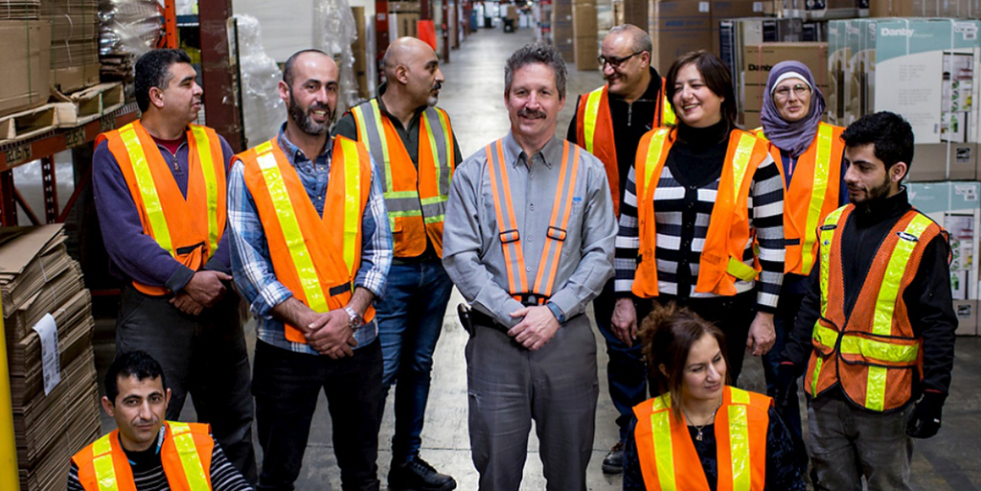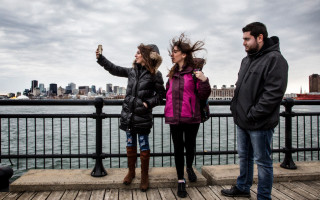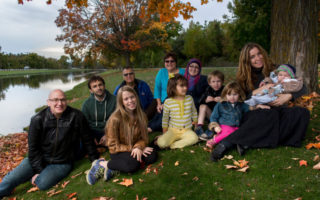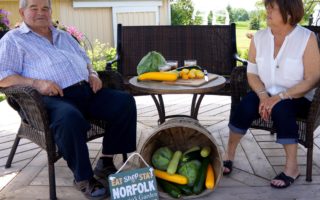
Jim Estill, centre, stands with Syrian workers at his company’s warehouse. © UNHCR/Annie Sakkab
Jim Estill explains why he is teaming up with community leaders to help resettle and employ refugees in Guelph, Ontario.
By Leyland Cecco and Annie Sakkab in Guelph, Canada
Jim Estill may have helped to resettle 58 refugee families in the Canadian city of Guelph, but he insists he has not done anything remarkable. Instead, the entrepreneur defers praise to the people he works with. “I am just really good at shaking hands,” he says, smiling.
A life-long entrepreneur and now CEO of an appliance company, Estill decided around 18 months ago to sponsor Syrian refugees fleeing their war-ravaged homeland. After doing the rough math, he estimated he could help bring more than 200 Syrians to Guelph.
It was no mean feat, coming in at a cost of Canadian $1.5 million. But he says the cascading events surrounding the war, coupled with a fear that he was not doing enough to help during a humanitarian crisis, prompted him to act.
“I do it because I believe in doing the right thing,” he says. “And this is the right thing to do. You can’t stand by and do nothing.”
“I do it because I believe in doing the right thing … You can’t stand by and do nothing.”
As Estill began to put his resettlement plans into practice, the local Islamic centre quickly became a close ally. Despite a busy schedule of caring for three children at home, Sara Sayyed was one of the volunteers who lent a hand. Her deft organizational skills soon led Estill to make her the ‘director of directors’ for the fledgling volunteer group. Before long, she was managing 800 volunteers. “It’s definitely a full time job,” she says.
Together, Estill and Sayyed realized that many refugees who arrive in Canada, after years of yearning for work and a steady income, need to learn English before venturing into the workforce.
“For many, it’s a difficult choice,” says Sayyed. “English class or getting a job. We asked ourselves – how can we do both?”
The pair decided to see what would happen if the entrepreneurial itch was scratched. The result was a homegrown programme called Ease Into Canada – a way for refugees to earn a steady paycheck at Estill’s warehouse and learn on-the-job English.
Estill trained the new arrivals, trying to place them as close to their field as possible, all with the added benefit of immersion in a language-rich environment. Most worked on the warehouse floor assembling packaging, but others found work in accounting or IT systems.
“You’re not trying to create dependency,” says Estill. “You’re trying to work people to independence. Independence is being able to pay your own way. Paying your own rent, buying your own groceries – that is success.”
The refugees gingerly navigated the noises and language of the warehouse floor, learning to be careful of forklifts and how to use the machinery.
“I promised myself and my family, we are going do everything we can here and maybe somebody will help us,” says Ahmad of his first days in Guelph. Soon, he had a full-time job. “When I started working, everyone knew me – I wasn’t a stranger. They knew my name. And right away, we are like brothers here. We work and we laugh together.”
Part of the success of the programme is location. For those fleeing the chaos of war, Guelph is a haven – a quiet city, often ranked as one of the best places in Canada to live. It has low crime rates, a mild climate and, most importantly, one of the lowest unemployment rates in the country. Companies are hungry for new talent and the refugees fill an economic gap. Estill was able to utilize his business contacts, striking deals with other companies to take Syrian workers – for every translator provided, local companies would hire four employees.
As the Syrians arrived, the community rallied and local storage space soon overflowed with donations. “We got so much stuff donated to the mosque that it soon became a fire hazard,” says Sayyed. “Bags and bags just showed up.”
“Our community has drawn together because of this… The churches, the mosque, the synagogue and the Sikh temple – every group has helped.”
Faith was no barrier. “Our community has drawn together because of this,” says Estil. “I went to the churches, the mosque, the synagogue and the Sikh temple – every group has helped.”
Even after resettling 48 of the planned 58 families, donations continue. Volunteers navigate floor-to-ceiling stacks of mattresses, chairs, kitchenware and clothing. Brand new winter boots sit unworn in boxes. But Estill continues to eschew the spotlight, only agreeing to interviews with major networks in the hope that others might help out.
Firas al Mohammed, one of Guelph’s recent arrivals, will never forget Estill’s life-changing help.
“He picked me up from the unknown,” he says. “He led me to a clear future and stable life.”
Originally published by UNHCR on 31 March 2017





